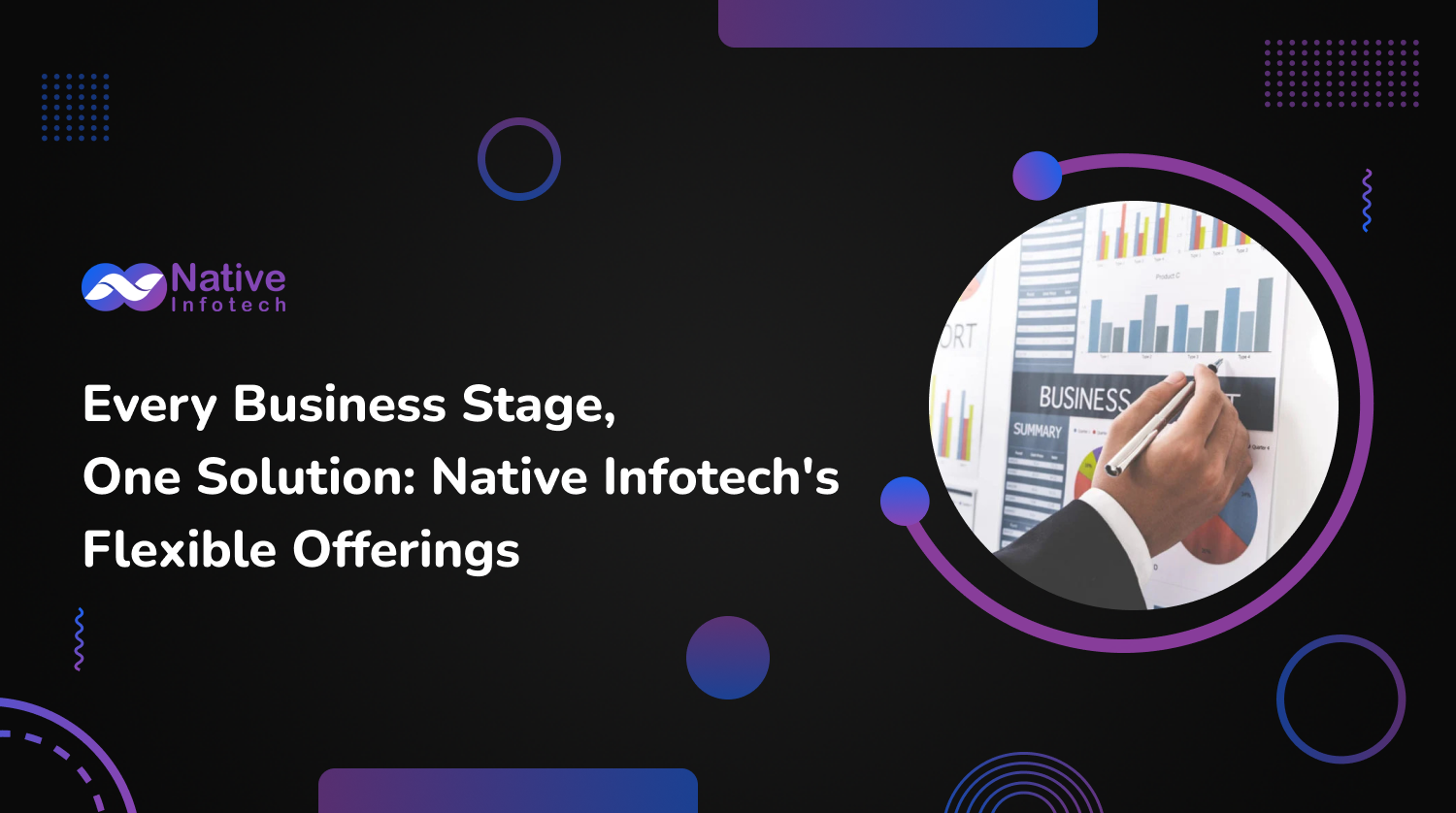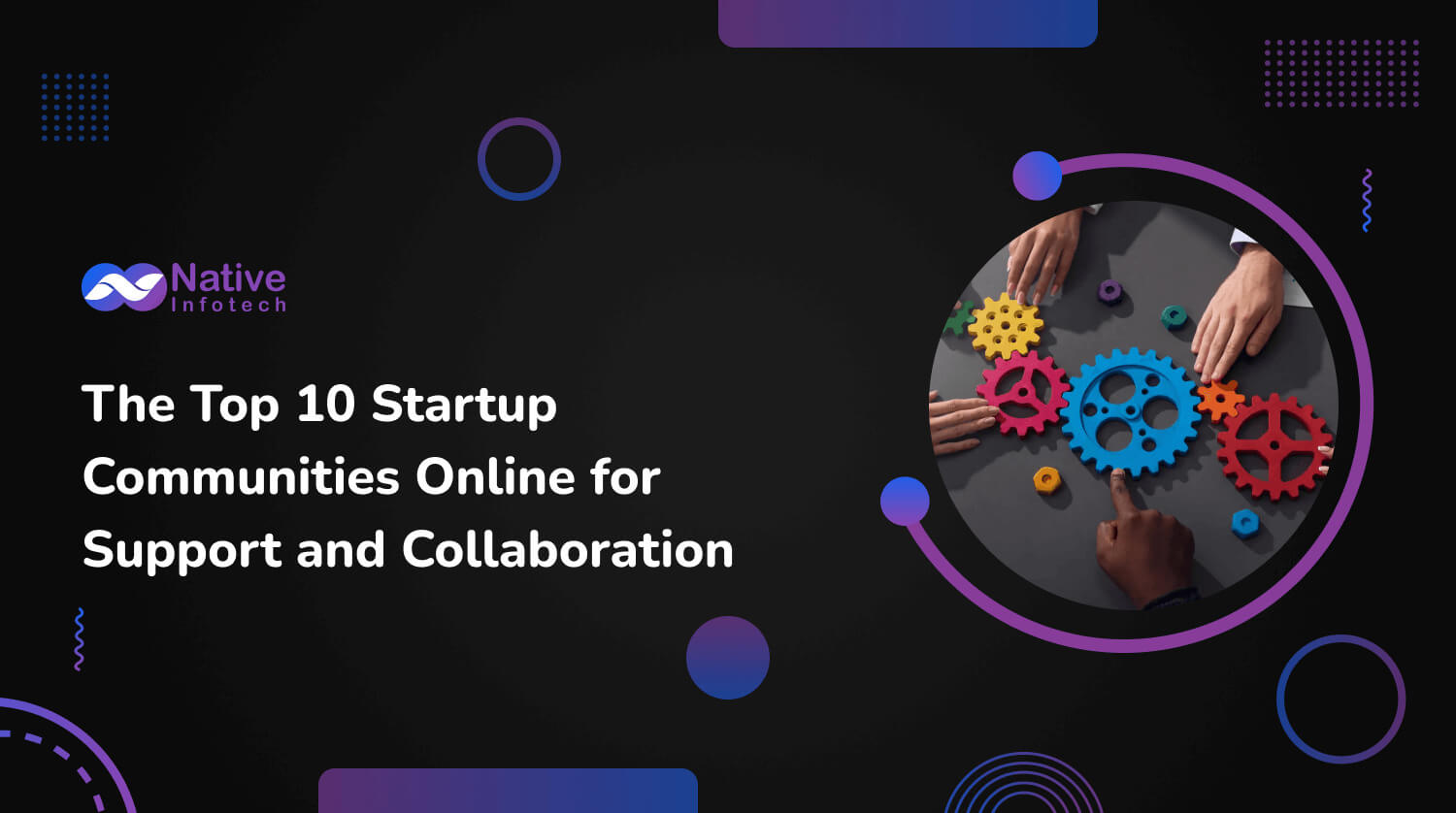
1. Startup stage (0-5%)
- IaaS (Infrastructure as a Service)
- PaaS (Platform as a Service)
- SaaS (Software as a Service)
- Flexibility and Scalability
- Cost Efficiency
2. Small business stage (6-25%)
- Customized Cloud Solutions
- Managed IT Services
- Improved Collaboration Tools
- Scalability
- Cost-Effective Pricing Models
- Continuous Support and Training
3. Medium business stage (26-50%)
- ERP and CRM systems
- Custom software development
- Cloud-based services
- Mobile app and web development
4. Large business/enterprise stage (51-75%)
- Big data analytics
- Enterprise resource planning (ERP) and customer relationship management (CRM) systems
- Cloud-based solutions
- Security solutions
5. Global enterprise stage (76-100%)
- Global infrastructure solutions
- Managed services
- Cybersecurity solutions
- Business continuity planning
- Digital transformation
- Conclusion
1. Startup stage (0-5%)
Native Infotech, as a cloud-based services provider, offers a suite of solutions tailored specifically for startups, especially those in the infotech sector. Our services span Infrastructure as a Service (IaaS), Platform as a Service (PaaS), and Software as a Service (SaaS), each designed to scale seamlessly with the dynamic needs of growing businesses.
-
IaaS (Infrastructure as a Service)
Startups often face the challenge of needing robust IT infrastructure without the capital for significant upfront investments. Native Infotech’s IaaS provides virtualized computing resources over the internet, enabling startups to rent servers, storage, and networking hardware based on their current needs. This model eliminates the cost of buying and maintaining physical servers and other data center infrastructure.
Startups can quickly scale their infrastructure up or down, paying only for the resources they use, which is particularly advantageous during different phases of product development and market entry. -
PaaS (Platform as a Service)
For startups focusing on software development, Native Infotech’s PaaS offers a compelling solution. It provides a framework that developers can build upon to develop or customize applications. This platform facilitates the coding, testing, and deployment processes, making it faster and less complex for startups to bring their products to market. By using PaaS, startups can focus more on their core product and less on the complexities of the underlying hardware and software layers.
-
SaaS (Software as a Service)
Native Infotech’s SaaS delivers applications as a service over the internet, eliminating the need for internal infrastructure or handling complex software and hardware management. Startups can subscribe to the services they need and access software applications on a pay-as-you-go basis from any device with an internet connection. This not only reduces the time it takes for startups to deploy software but also minimizes the recurring expenses of software upgrades, maintenance, and support.
-
Flexibility and Scalability
The cornerstone of Native Infotech’s offerings is the flexibility and scalability that is crucial for startups. As startups grow, their technology needs evolve, and having a cloud service provider that can adjust and scale the services accordingly is vital. Native Infotech enables startups to adapt their IT requirements in alignment with their business growth, market changes, and budgetary constraints.
-
Cost Efficiency
By leveraging Native Infotech’s cloud services, startups can significantly reduce their operational costs. The pay-as-you-go model ensures that startups pay only for what they use, which optimizes their IT expenditures. This cost efficiency is especially beneficial during the early stages of a startup, where capital is typically limited.
Native Infotech is dedicated to supporting the growth and innovation of startups in the infotech sector by providing cloud-based solutions that are not only efficient and scalable but also cost-effective. This approach helps startups maintain a lean operation while focusing on scaling their core business activities.
2. Small business stage (6-25%)
- Customized Cloud Solutions
- Managed IT Services
- Improved Collaboration Tools
- Scalability
- Cost-Effective Pricing Models
- Continuous Support and Training
-
Customized Cloud Solutions
Native Infotech offers customized cloud solutions that fit the unique needs of small businesses. Whether it’s selecting specific components of IaaS, PaaS, or SaaS, MicraSol can tailor its offerings to match the specific requirements of a business’s operations, size, and sector. This customization ensures that small businesses aren’t paying for unnecessary features while getting exactly what they need to operate efficiently.
-
Managed IT Services
As small businesses often lack the resources to maintain a large IT department, Native infotech’s managed IT services can fill this gap. We can handle the complexities of server management, data storage, cybersecurity, and network maintenance. This allows small business owners to focus on core business activities without being bogged down by IT management tasks.Improved Collaboration Tools
Native Infotech’s cloud-based solutions include tools and platforms that enhance collaboration among team members. These tools can help small businesses improve communication, project management, and file sharing, which are crucial for teams that are possibly remote or distributed. Enhanced collaboration tools ensure that all team members can work effectively, irrespective of their location.Scalability
As small businesses grow, their technology needs will change. Native Infotech’s scalable solutions ensure that as your business expands, your IT infrastructure can grow with you. This scalability is vital for small businesses that anticipate growth but want to avoid over-investment in IT resources prematurely.
-
Cost-Effective Pricing Models
Native Infotech understands the budget constraints typical of small businesses and offers cost-effective pricing models that make high-quality cloud services affordable. Our pay-as-you-go and subscription-based pricing models ensure that small businesses can predict their IT costs and plan accordingly, helping them maintain financial stability while accessing essential technology.
Continuous Support and Training
Native Infotech provides continuous support and training to ensure that small businesses can maximize the use of provided cloud services. This includes regular updates, security patches, and user training sessions to keep staff updated on new features and best practices. This support is crucial for small businesses that need to stay competitive and secure in a digital environment.
By leveraging Native Infotech’s tailored and scalable cloud solutions, small businesses can
achieve higher operational efficiency, improved team collaboration, and a better alignment of their IT spending with business growth objectives. These advantages are essential for businesses aiming to transition smoothly from a small to a medium-sized operation.
3. Medium business stage (26-50%)
- ERP and CRM systems
- Custom software development
- Cloud-based services
- Mobile app and web development
- ERP and CRM systems
ERP systems integrate various functions essential to running a business into a single, comprehensive system. The primary purpose of an ERP system is to improve organizational efficiency by managing and improving how company resources are utilized. - Features:
Integration
Automation
Data Analysis
Scalability - Benefits:
1. Improved organizational efficiency and productivity through integrated and optimized processes.
2. Improve decision-making through centralized and real-time data access.
3. Reduced operational costs due to streamlined operations and automation.
Customer Relationship Management (CRM) Systems
CRM systems are designed to manage a company’s interactions with current and potential customers. They help businesses improve profitable customer relationships through managing customer contact information, sales interactions, and marketing campaigns.
Key Features:
Contact Management
Sales Tracking
Marketing Tools
Customer Service
Benefits:
Improve understanding and segmentation of customers, leading to more targeted marketing efforts.
Improved customer satisfaction and loyalty by providing more personalized and efficient service and interactions.
Increased sales through better timing and understanding of customer needs.
Integration of ERP and CRM
While ERP focuses on optimizing internal company operations and efficiency, CRM concentrates on external customer relations. Integrating ERP and CRM can bring significant benefits by aligning a company’s internal processes with its customer-facing efforts. This alignment ensures that customer needs directly inform product development, inventory management, and overall strategic planning, resulting in improved customer satisfaction and business performance.
4. Large business/enterprise stage (51-75%)
- Big data analytics
- Enterprise resource planning (ERP) and customer relationship management (CRM) systems
- Cloud-based solutions
- Security solutions
-
Big data analytics
Big data analytics is like a giant, super-smart detective that examines massive piles of data to find patterns, trends, and secrets. Imagine you have a huge pile of puzzle pieces, and you need to figure out what picture they can make, how the pieces fit together, and what pieces are missing. Big data analytics uses powerful computers and smart algorithms (which are like sets of instructions) to sift through all that information quickly and efficiently. This helps businesses make better decisions, understand their customers more deeply, and even predict what might happen in the future.
-
Enterprise resource planning (ERP) and customer relationship management (CRM) systems
Enterprise Resource Planning (ERP) and Customer Relationship Management (CRM) are two types of software systems that help businesses run more smoothly.
ERP systems
are like the brain of a company. They help manage all the different parts of a business—like inventory, purchasing, finance, and human resources—all in one place. This helps everyone in the company stay organized and makes it easier to see how the whole business is doing.
CRM systems
focus on everything related to customers. They keep track of all interactions with customers, manage sales information, and help businesses understand what their customers need and want. This helps companies provide better service and sell more effectively.
In simple terms, ERP helps manage your business internally, while CRM focuses on your relationships with customers outside the business. -
Cloud-based solutions
Cloud-based solutions refer to services, software, and resources that are available over the internet instead of being stored on your personal computer or a server in your home or office. Think of it like using a library via a computer without needing to store all the books at your home. You can access data, use applications, and store files online, and you can reach them from any device that has internet access, anywhere and anytime. This way, you don’t need to worry about maintaining and updating the systems yourself because the service provider handles all that for you.
-
Security solutions
Security solutions are measures and tools designed to protect computers, networks, and data from unauthorized access, theft, or damage. Think of it like having locks and alarm systems for your house, but in the digital world. These solutions can include antivirus software that acts like a bodyguard against harmful viruses, firewalls that serve as gated barriers to block unwanted visitors, and encryption methods which scramble your data into a secret code so only people with the right key can read it. These security steps help keep your personal information, like passwords and bank details, safe from hackers and other cyber threats.
5. Global enterprise stage (76-100%)
The “Global Enterprise Stage” refers to a phase where a company operates extensively worldwide, covering 76% to 100% of its potential global market. At this stage, the company has significant international presence with operations, production, and marketing adapted to various global markets. It focuses on maintaining competitiveness, optimizing global operations, and adhering to international regulations. This stage represents the peak of a company’s expansion, making it a key player in the global market.
Global Infrastructure Solutions
At this stage, an enterprise focuses on establishing and upgrading a robust global infrastructure that supports large-scale operations across multiple countries. This involves deploying advanced network architectures, data centers, and telecommunications systems that ensure seamless connectivity and performance worldwide. The aim is to create a scalable and flexible infrastructure that can adapt to the evolving demands of global business landscapes.
Managed Services
Managed services become crucial as they allow businesses to outsource daily IT operations, enabling them to focus on core business strategies while ensuring efficiency and technological advancement. These services include comprehensive management of IT resources, from network services and cloud computing to end-user systems and applications, all handled by dedicated experts.
Cybersecurity Solutions
As enterprises expand globally, they face increasingly complex cybersecurity threats. Implementing cutting-edge cybersecurity solutions is paramount to protect sensitive data and maintain business integrity. This includes advanced threat detection, risk management, incident response strategies, and ongoing security assessments to guard against both external attacks and internal vulnerabilities.
Business Continuity Planning
Business continuity planning is essential to ensure that the business can operate effectively despite unexpected disruptions. This involves creating strategies that help minimize downtime and maintain critical operations during emergencies, such as natural disasters, technical failures, or cyber-attacks. Effective continuity plans are tailored to the unique needs of each global location, ensuring that all branches can recover swiftly and continue operations.
Digital Transformation
Digital transformation at this stage involves leveraging digital technologies to fundamentally change how businesses operate and deliver value to customers. It’s about integrating digital technology into all areas of the business, automating processes, and making data-driven decisions to improve efficiency, customer engagement, and innovation.
Conclusion
Reaching the global enterprise stage signifies a pivotal achievement in an organization’s growth. It is characterized by a strong foundation in global infrastructure, strategic outsourcing through managed services, robust cybersecurity defenses, comprehensive business continuity strategies, and innovative digital transformations. These elements combine to enhance global competitiveness and operational excellence in a rapidly changing world.
Exploring the Future: 5 Big Changes Coming to Computers in 2024 and How to Get Ready
Are you ready to dive into the future of computing? The year 2024 promises to be an exciting time for technological advancements, with significant changes expected to revolutionize the way we interact with computers. From quantum computing to augmented reality, here are five big changes coming to computers in 2024 and how you can prepare…
Making Waves: How Your Website Sets Your Startup Apart from Competitors
Starting a new business journey can be really exciting. But nowadays, just having a good idea isn’t always good enough. To stand out and do well, you need a great website. Your website is like your online home base. It’s where people learn about your business and decide if they want to work with you…
The Top 10 Startup Communities Online for Support and Collaboration
In the world of new businesses, being part of a good community for help and working together is really important for success. It doesn’t matter if you’re just starting out or if you’ve been running your own business for a while, meeting people who think like you can give you really helpful advice, tools, and…


